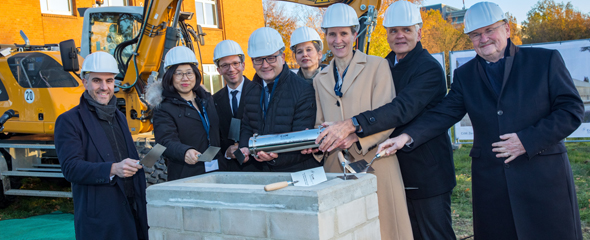"The COVID-19 pandemic has just shown us how important infection research and personalised medicine are - and that research findings need to to be transferred more quickly from bench to bedside," said Lower Saxony's Science Minister Falko Mohrs. "The life sciences are one of the most important drivers of innovation, especially in the metropolitan region of Hannover-Braunschweig-Göttingen-Wolfsburg, and promise significant improvements in diagnosis and therapy. The new research building in the Medical Park will give the interdisciplinary research groups of CiiM the opportunity to realise their vision of better individual patient care."
"By using state-of-the-art molecular, imaging and data-based technologies, research is being conducted at CiiM to understand the individual course of infectious diseases much more precisely than before, in order to be able to offer tailored treatments for individual patients or groups of patients in the future," said Prof Dirk Heinz, Scientific Director of the HZI.
Prof Michael Manns, President of the Hannover Medical School, added: "The CiiM research building is another documentation of the strategic partnership between the MHH and the Helmholtz Centre for Infection Research in Braunschweig. Personalised medicine is becoming increasingly important for many areas of medicine in order to provide the individual patient with the optimal therapy in terms of effectiveness, tolerability and costs. CiiM has international model and flagship character for personalised infection medicine."
Moderated by the CiiM directors Prof Markus Cornberg and Prof Yang Li, the ceremonial groundbreaking took place, during which a time capsule was embedded, which contained current impressions of the event as well as wishes from the guests and future users of the CiiM.
Once completed, the CiiM building will allow patient data and samples to be systematically stored, processed and analysed with state-of-the-art technologies under one roof. For example, the scientists are looking for individual aspects that lead to different severity of disease. The aim is to identify new biomarkers that can be used to develop adapted therapy approaches. These should then clearly define who needs to be treated particularly quickly, how long treatment should last and what happens to patients who do not respond well to treatment. The individualised approach will help to reduce the burden of disease, improve the quality of life of those affected and reduce the healthcare costs caused by infections. CiiM will thus combine the internationally unique expertise from clinical practice, research and data science in a transdisciplinary workflow that focuses on the individual infection patient and their best possible treatment.
